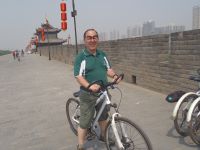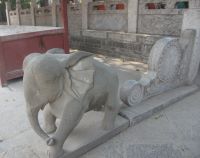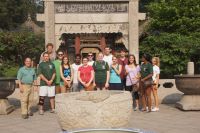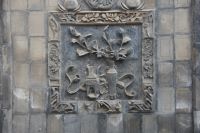We’re now 600 miles and over 1000 years removed from the Tang capital of Xi’an (and a 13 hour train ride) in the capital of China (mostly) since the Mings moved back here to better combat the barbarians from the North. We’re in Beijing, capital of the People’s Republic of China, a city of 16-19 million people that now commands respect from the rest of the world, as Chang’an once did.
 We left Xi’an having done two of my favorite top five things to do in the former capital. One was the 14k bicycle ride around the top of the wall around the city. There’re not a lot of old things to be seen from it, but there is a lot of reconstruction of the old, and construction of things that look old that abut the wall. One of the latter is “antique street,” made to look old, but housing the chain stores and hostels that have made China a tourist mecca (and in many cases one that is over the top; one thing I see more of , is the wide screen presentations, even in places like the Temple of Heaven, complete with advertisements—oh, those marketers; they seem to be pushing the definition of gauche to new levels); one of the former is a temple in the corner of the city within the wall.
We left Xi’an having done two of my favorite top five things to do in the former capital. One was the 14k bicycle ride around the top of the wall around the city. There’re not a lot of old things to be seen from it, but there is a lot of reconstruction of the old, and construction of things that look old that abut the wall. One of the latter is “antique street,” made to look old, but housing the chain stores and hostels that have made China a tourist mecca (and in many cases one that is over the top; one thing I see more of , is the wide screen presentations, even in places like the Temple of Heaven, complete with advertisements—oh, those marketers; they seem to be pushing the definition of gauche to new levels); one of the former is a temple in the corner of the city within the wall.
Outside of the wall, we went to a Buddhist temple that was the birthplace of a monk who founded one of the eight major sects of Buddhism (the most well known in the West is probably Chen, better known through its Japanese version, Zen, which had something to do with the art of motorcycle maintenance in my youth). What was distinctive about that temple was that there were elephant statues, and I had to confess that I’ve never seen elephants in a  Buddhist temple before; one of the guardians of the temple was riding an elephant, and another a lion. It struck me that the temple was closer to Hindu temples (each of the major Hindu gods has an animal as a transporter, and of course, the elephant god, Ganesh, is one of the most popular of the Hindu pantheon).
Buddhist temple before; one of the guardians of the temple was riding an elephant, and another a lion. It struck me that the temple was closer to Hindu temples (each of the major Hindu gods has an animal as a transporter, and of course, the elephant god, Ganesh, is one of the most popular of the Hindu pantheon).
The other top five thing to do in Xi’an is to wander the Muslim quarter. Called the Hui nationality, one of the 50 some the Chinese recognize, the Muslims have an area that centers on the Great Mosque. I like the Mosque because it shows what happens if you stay in China long enough—you become Chinese! There’s a Chinese like gate at the entrance 
 (called a pailou) that is very Chinese.
(called a pailou) that is very Chinese.
Unfortunately, it was being renovated, but the minarets that look like pagodas were a dead giveaway that this was a mosque in China that had been here for centuries, ever since Muslims came to China on the Silk Road. The area is fun to wander for food (lots lamb kebabs), supplemented this week by a Malaysian food fair (yummy durian—that’s a joke for those who don’t know that durian is supposed to be the fruit that smells like hell but tastes like heaven—the former is certainly true), souvenirs including Muslim caps and calligraphy in Arabic, and the general run of copy everythings that are everywhere in China.
I think I’d really like to come back to Xi’an sometime and spend a week in the area, exploring the thousands of places that reflect the thousand years of Xi’an/Chang’an. Building here is like building in Rome; you’re likely to uncover something no matter where you build. A Han tomb was discovered near the airport, and for another, there’s a temple about 90 miles from Xi’an that houses a finger of the Lord Buddha; it’s become kind of a theme park, I understand, but this is a piece the Buddha gave China. I understand he willed one body part to each of the Buddhist lands, so this is rare.
I’d like to have the guide we had in Xi’an again; her email handle is sunnyok, and that well described her willingness to share her knowledge and her love of Xi’an with us. She told me that she was from Manchuria, and as I suspected, was half-Manchu, one of those 56 nationalities, the 8% who are not Han Chinese. As a minority, she says that she gets some privileges, including extra points on the college entrance exams, and the right to have two children. She said that in any case, she and her Han husband can have two children because they have no siblings, so the one child policy has relaxed somewhat.
I think I’ll save my observations about Beijing for tomorrow, since I’m planning to get up at 4:30 to view the raising of the flag in Tiananmen Square, which is about three blocks from our hotel.